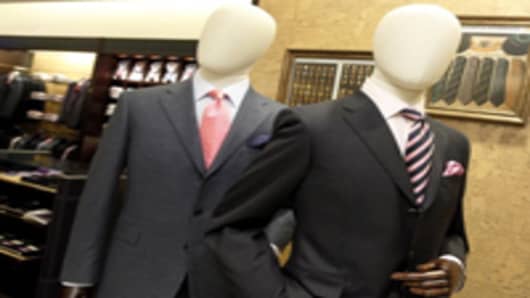Contrary to popular perception, men — not women — make up the bulk of consumers buying luxury goods in China. From Giorgio Armani clothes to Gucci handbags and Rolex watches, Chinese men have been outstripping women when it comes to shopping.
In 2010, Chinese men spent 7 billion yuan ($1.1 billion) on their wardrobes, far more than the 2.8 billion yuan spent by women, according to a Bain report. Further, the market for luxury menswear in China is expected to rise 9 percent in 2011 compared to 7 percent for women’s wear, according to the consulting firm.
Looking to tap this spending power of Chinese men is Landmark Men - a 60,000 square-foot men’s-only mall in Hong Kong. Luxury brands like Valentino Men, Gucci and Louis Vuitton are nestled amongst premium grooming products, fragrances and gadgets in this sprawling mall that opened in October 2011.
Victor Luis, president of Coach Retail International in Shanghai was quoted by the Los Angeles Times as saying men make up 45 percent of the $1.2 billion market for all luxury handbags in China. In the U.S., that figure is just 7 percent. He added that "There's a confidence and comfort in Chinese men utilizing bags in the same manner as women do."
Vinay Dixit, Senior Expert and Leader of McKinsey Asia Consumer Center, told CNBC that over the past 12 months, Chinese men on average spent 61 percent more than women on fragrances and 52 per cent more on watches.
Seeing this growing affinity among Chinese men to shop, luxury brands are going all out to woo them. Dior Homme, for example, has around 35 freestanding men’s stores in China.
Burberry, the maker of the iconic check trench coat, has opened 59 stores in 31 Chinese cities with every store carrying a wider selection of men’s styles compared to other markets.
Louis Vuitton now has 36 stores in 29 cities across the mainland, compared to stores in just 10 cities in 2005. The company has used an Asian male model for the first time in its 2011 advertising campaign, a likely attempt to woo the male shopper in China.
Other retailers are also expanding rapidly. Gucci, which started with just six stores at the beginning of 2006, has 39 stores today. Hermes quadrupled its stores from five in 2005 to 20 today. All these stores house the company's full range, including menswear. “There’s a reason for the rush: while many other markets are flat or shrinking, luxury goods are booming in China,” according to a 2011 McKinsey Insights China research report.
The report points out that China will account for over 20 percent of global luxury sales by 2015 and will overtake Japan as the world’s largest market for luxury goods. Market watchers say Chinese male consumers will drive much of this growth.
The average male luxury shopper in China is less than 45 years old, educated, well-traveled and entrepreneurial, says McKinsey‘s Dixit.
According to a senior manager at a prominent luxury brand in Hong Kong, until a few years back, luxury consumption in China was a result of businessmen traveling abroad and bringing home fine goods. “Men were bigger shoppers than women, buying gifts for wives and business associates, very often for government officials,” he said.
But the motivations have now changed. Men are now rewarding themselves for hard work and success. “They also consider luxury labels as lending credence to not just their social status, but individual style,” said the McKinsey report.
L’Oreal, the French personal care products company, now sells more male grooming products in China than in Western Europe, according to media reports.
Sales in China in 2010 rose to 9.085 billion yuan ($1.38 billion), an 11.1 percent increase over the previous year, and a double-digit gain for the 10th consecutive year, said Alexis Perakis-Valat, CEO of L'Oreal China at a news conference in Beijing earlier this year.
According to a recent seven-country survey conducted by the New-York based Luxury Institute, attitudes toward shopping for luxury goods were far more positive in China than in rich nations. Seventy-five percent of Chinese said that luxury expenditures were “prudent” purchases, while 78 percent of wealthy consumers in the U.S., U.K., and Germany considered them to be an “extravagance.”


